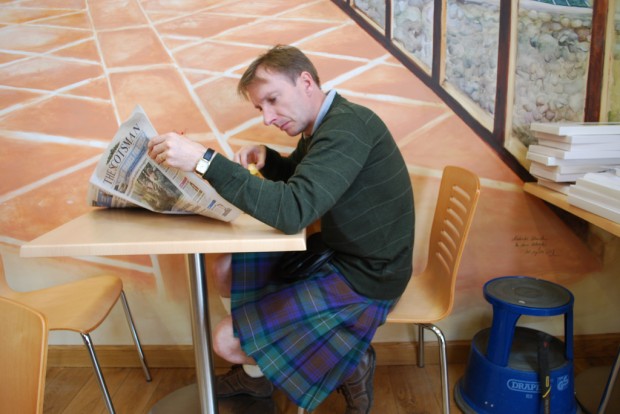You have no items in your cart. Want to get some nice things?
Go shopping
In keeping with Litro’s current Mystery theme, I’m setting out to solve something of a literary missing-persons case: the lack of Scottish characters – real, independent Scottish characters, that is – in so called “English” literature. I’ll attempt to track down the concept of Scotland as an independent country in the mainstream media too. Because in truth, there seems to be a curious absence where these things should be.
Since the Act of Union in 1707, attempts to integrate the cultures of Scotland and England into the culture of Great Britain have in fact been the imposition of English values over Scottish. From the moment “Rule Britannia” was composed, everything English suddenly became British. British University Tuition Fees, British riots. Meanwhile any serious discussion of Scottish Independence, and the referendum set to be held in 2014, is sidelined. Scots do not have a true, real, or independent voice in the mainstream media.
According to James Kelman, one of Scotland’s most important living writers, “there has never been a time in the history of this country when censorship and suppression did not exist. […] The film, theatre, newspaper and mainstream magazine industry, all exercise censorship, they collude in suppression.” Part of this suppression is a failure to permit nationalists in Scotland (and indeed, Wales and Northern Ireland) a voice.
In 1748, Adam Smith’s Lectures on Rhetoric and Belles Lettres began a conscious effort to standardize the English language; cultivating the “most imperfect” dialects found in regions of Britain.
This standardisation of language has meant the obliteration of entire cultures and communities. Thousands of voices silenced, or pushed to the margins, seen as inherently other, as beneath those who hold this all-important power of perfect speech.
If you take away an individual’s language, you take away their ability to speak, to communicate with those around them. In doing so, you take away their heritage, their culture, their syntax and meaning. Without these things, they cannot have a voice, a self, and their freedom to express themselves is restricted.
Kelman’s Booker Prize winning novel How Late It Was, How Late acts as a subversion of this controlling language, this “Standard English”. The changes in syntax, the interior monologue technique which leave paragraphs unfinished and the frequent use of expletives such as “fuck”, act as a retort to the conception that there is a “right” and “wrong” way to speak. One group of people’s words have more right to appear on the page or in the media than those of others.
You will be hard pushed to find a real Scottish character in “English” literature; real – not simply a cut-out, stereotypical figure whose voice is inherently apart and other from the “standard” English of the rest of the page. Perhaps real Scottish people can’t be found in English Literature at all. In his essay, The Importance of Glasgow In My Work, Kelman notes how Scottish characters “were confined to the margins, kept in their place, stuck in their dialogue. You only ever saw them or heard them.”
Kelman continues, in a typically brilliant manner:
“Everybody from a Glaswegian or working class background, everybody in fact from any regional part of Britain – none of them knew how to talk! What larks! Every time they opened their mouth out came a stream of gobbledygook. Beautiful! their language a cross between semaphore and Morse code; apostrophes here and apostrophes there; a strange hotchpoth of bad phonetics and horrendous spelling – unlike the nice stalwart upperclass English Hero (occasionally Scottish but with no linguistic variation) whose words on the page were always absolutely splendidly proper and pure and pristinely accurate, whether in dialogue or without. And what grammar! Colons and semi-colons! Straight out of their mouths! An incredible mastery of language. Most interesting of all, for myself as a writer, the narrative belonged to them and them alone. They owned it.”
How Late It Was, How Late serves as a challenge to these conceptions. It gives a voice to those “confined to the margins”. The protagonist, Sammy, exists within the narrative, sharing the same dialect, never confined to the margins or imprisoned as something “other” by quotation marks. The novel also provides us with a glimpse of the elusive “real” Scotsman we set out to find. However, this brings no feeling of closure. Ultimately Sammy is left, “out of sight” and by inference, also out of mind. Just like Sammy, the nation of Scotland itself is continually confined to the margins of mainstream media coverage. There is a studious dodging of issues of independence and devolution by the press. Meanwhile, film adaptations of other great works of Scottish Literature (think Danny Boyle’s Trainspotting) ignore the cultural and political heart of the works they are born from, and exist as soulless nothings in a tide of “Cool Britannia” rhetoric.
In 1994, when Kelman won the Booker Prize, the controversy that followed deterred publishers from promoting his subsequent books. Indeed, the author was held up to public ridicule; made out to be something far less than he was, just as Scottish characters appear so much less than they are in “English” Literature. A contemporary columnist at The Times compared the experience of reading Kelman to being stuck in a train carriage with a drunk Glaswegian. It’s possible this columnist may have missed the point of it all.
There is a certain adamance among English institutions that Scots don’t actually have this ‘voice’ they claim to have. How very dare they decide amongst themselves that their values are Scottish, not British, their language Scottish, not “Standard” English, the attitude seems to be. Because of this, the search for accurate representations of Scottish people; Scottish culture; continues. There are, of course, some fantastic writers who do write independently of old English literary rhetoric. It is why certain great works of “English” Literature aren’t actually English at all. Look to the works of Irvine Welsh, Janice Galloway, Gregory Burke and Alasdair Gray. Here you might find a certain voice that has been otherwise suppressed.

There are, it must be said, some platforms that do discuss these issues. In an increasingly digital world, these are found on the web. Sites such as OpenDemocracy have consistently started debates about Scottish independence and devolution. Yet web publishing is increasingly dominated by giant corporations and lone bloggers. OpenDemocracy is under threat of closure at the end of this month. If it goes, another independent space where we might find otherwise unspoken I topics will be lost. You can donate here.

About Samuel Dodson
Samuel Dodson is an award-winning writer and editor based in London, UK. A graduate (BA and MA) of the Warwick University Writing Programme, he has appeared on the BBC and LBC, and is the founder of Nothing in the Rulebook – an international collective of writers and artists. His first book, ‘Philosophers’ Dogs’, will be published by Unbound in 2021.
- Web |
- More Posts(4)





The case of the mysterious missing Scottish characters in English literature in
@InstantIdealism’s
#EssaySaturday. https://t.co/S4uZ5Hm3QL
Check out my first article for @LitroMagazine ! https://t.co/GYbQzfpciW #EssaySaturday #Scotland @openDemocracy
Read the essay by Inkling’s own @InstantIdealism on @LitroMagazine https://t.co/wxksY6FXQO